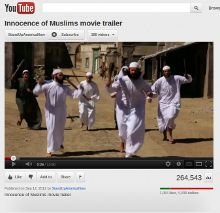Murder, YouTube, and Censorship


Innocence of Muslims is a crude and trashy video that portrays the Prophet Mohammad as a hate-mongering bum who approves of violence and sexual child abuse. Considered by Western audiences that adores the popular cartoon South Park, which mocks many religions on a regular basis, Innocence of Muslims is clearly insulting, but it's too boring to be worth a second thought. By conservative Islamic standards it's blasphemy. And, it's sparked the murder of four American diplomats in Libya.
Largely ignored at first, for the simple reason that's it's really not very good by any standard, this YouTube video has now been seized as an excuse for protests and attacks on American embassies in Egypt, Libya, and Yemen.
Google, YouTube's owner, but in no way, shape, or form the video's creator, is stuck between a rock and a hard place. On the one hand, as part of the Western culture, they're invested in freedom of speech. On the other, this shabby video has been used as an excuse for murderous attacks.
Publicly, Google has said, “We work hard to create a community everyone can enjoy and which also enables people to express different opinions. This can be a challenge because what's OK in one country can be offensive elsewhere. This video—which is widely available on the web—is clearly within our guidelines and so will stay on YouTube. However, given the very difficult situation in Libya and Egypt we have temporarily restricted access in both countries.”
Since then, YouTube has blocked the video in India. Other Islamic countries, such as Indonesia, Pakistan and Afghanistan have already blocked access to the video on their own. Google has yet to respond to queries about further plans to block the video.
The Electronic Frontier Foundation (EFF) thinks Google shouldn't take censorship too far. “It is easy to understand why YouTube might feel compelled to act in response to the rioting over this video, especially after three U.S. embassy employees were killed in the Libyan city of Benghazi, but the blame for the violence lies not with the video, but with the perpetrators. Once YouTube has made the decision to pro-actively censor its content, they start down a slippery slope that ends in YouTube Knows Best moral policing of every video on their site. It is disappointing to see YouTube turn its back on policies that have allowed it to become a such a strong platform for freedom of expression. We hope that this new-found enthusiasm for pro-active censorship is a temporary aberration rather than a sign of things to come.”
The real aberration is that we live in a world where a video by a shadowy figure whose real identity remains unknown can provoke unjustified attacks on innocents. Indeed, the American ambassador, Chris Stevens who was murdered in an assault on U.S. Consulate in Benghazi. Libya, had opened the U.S. diplomatic mission to the Libyan revolution at risk of his own life.
In a world where the Internet binds us together, there are no easy answers to questions of censorship. One person's sacred belief is another's sacrilege. Google can try to balance censorship and danger, but there are no black and white answers. Indeed, for all of Google's importance, they have little real control. Even were they censor the original video everywhere, copies would, and indeed already have, sprang up all over the Internet.
In the end, Internet censorship, no matter how justified, will fail. We can only hope that wise men and women will eventually prevail over the fanatics whose response to the words and images from the larger world lead only to pointless death and terrorism.
Related Stories:
YouTube censors controversial video in the Middle East
South Korea tightens ID checks on adult sites
No Twitter ban in India despite previous warning
Sex Tech: Kinsey app pulled, Grindr politics, porn for Palestine